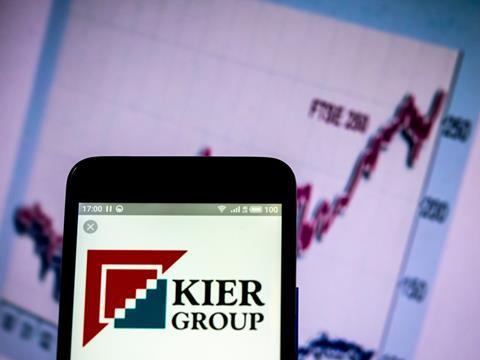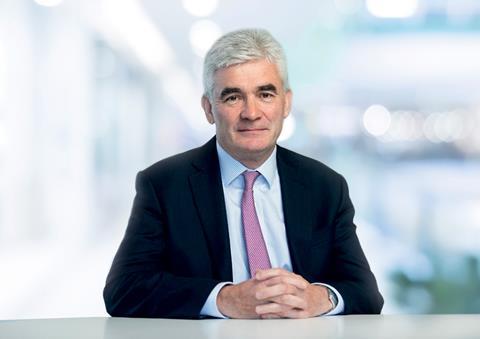Plenty left to do but encouraging results from Andrew Davies’ turn-around strategy mean debt-free future is in sight
For a man who used a cricketing analogy to end his interim results meeting with analysts this morning, Kier chief executive Andrew Davies is reluctant to say whether the firm’s balance sheet problems have been hit for six after an encouraging few days.
“We can draw stumps there,” Davies said after a 45 minute presentation capped off a five-day period that has seen the firm finally reach a deal to sell its housing business, Kier Living, for £110m. He was also able to boast a return to profit and, perhaps most revelatory, unveil a plan to wipe out the firm’s debt pile – which Kier watchers will know has hung around its neck for a long time – returning it to a net cash position within three years.

But asked if a corner had been turned this past week, Davies was reluctant to say so. “Quite pleased,” was how he described his feelings about progress so far. “There is still a lot to do.”
To keep the cricketing analogy going, when Davies joined the business in April 2019 Kier was probably three wickets down for 10 runs – his first results presentation saw Davies announce a pre-tax loss of £245m – the pitch was playing havoc and the firm was facing terrifying fast bowlers from both ends. Now, a rebuilding job later, the firm is probably about 100-3. Not bad but a couple of wickets away from being in trouble again.
Davies is keen to share the praise around, lauding Kier’s staff and his restructured management team. “Everybody has been quite phenomenal,” he says.
But there is no doubt the steady hand of the 57-year-old has been a major influence in turning around a business which, when he joined, questions were justifiably being asked about its survival chances.
The Carillion collapse was fresh in the memory – historians will wonder what Davies could have done there if his original career trajectory to take up the post of chief executive at that firm had not been stopped in its tracks by its implosion. Meanwhile Kier had just got rid of its chief executive after a botched rights issue had been given a resounding thumbs down with just a third of shareholders taking it up. As a vote of confidence at that point in time, it was not much of one at all.
Davies’s turn-around strategy
Pretty much the first thing Davies did was order a strategic review of the business. It was supposed to report in July that year but such was the urgency, it came out a month before.
Davies concluded what many thought was inevitable – housing, its most sellable asset, had to go and, furthermore, it was selling or reducing its exposure to property, FM and environmental services. He added it would cut 1,200 jobs to produce annual savings of £55m from 2021.
In fact, 1,700 jobs went and the annual savings by its year-end this June are expected to be £115m – an upgrade of 109%.
Operational performance is robust and cashflow is coming through. It simply wasn’t there in the previous equity raise
Andrew Davies, Kier
“We had to fix the operational side of things,” Davies says, adding the firm’s improving operational performance, which saw operating profit from its continuing business edge up 2% to £47.6m in the six months to December 2020, meant now was the time to launch a fresh equity raise in which it is hoping to get somewhere between £190m and £240m.
“The quality of the business is now coming through with these [interim] results and it’s a good time to go to the market,” he adds. “Operational performance is robust and cashflow is coming through. It simply wasn’t there in the previous equity raise.”
Net cash position in two years

Davies says confidence in the business is such it is now targeting a net cash position within the medium term, with his chief financial officer Simon Kesterton telling analysts the target could be reached within two years. “Totally achievable in the medium term,” is Davies’s upbeat assessment of wiping out the debt.
Carried out under the firm’s former watch, the previous equity raise, Davies admits, was primarily used to restructure the business and get its payment times to suppliers down – leaving little room for making inroads into its debt.
Its average month-end net debt in its latest interim results is in line with expectations at £436m but it’s worth pointing out this has actually gone up from the figure published in those first set of results announced by Davies in September 2019 when it was £422m.
“There’s clearly been a focus on the balance sheet,” Davies adds, “and you cut debt three ways: improve the operating performance of the business, divestment of non-core assets and the third way is an equity raise based on the quality of the operating business.”
There is a bit more riding on the equity raise than the simple elimination of debt with Kier saying this morning that its agreements with its lenders to extend credit facilities until 2025 are “conditional on [a] successful equity raise”.
The equity raise has vexed some, though, with Cenkos analyst Kevin Cammack saying it “somewhat overshadows today’s interim results” which, analysts agreed, were pretty good. He adds: “To put that fund raising into context, Kier’s current market cap [how much a company is worth] is c£150m.”
‘Very good’ interim results
Numis analyst Jonny Coubrough says the results are “very good with an improved underlying margin, a return to reported profit and positive free cash flow, stable average net debt, and a better orderbook”.
He adds: “In our view, this demonstrates that management is delivering on operational and cost savings guidance, which have again been upgraded, and it has now set out clear medium-term financial targets.”
These are revenues of £4bn to £4.5bn and an operating margin of 3.5% which would give it earnings of £150m. “All this on a debt free balance sheet within the next two to three years,” Cammack remarks. “Frankly that does not seem an unreasonable proposition – in theory.”
He says “new shareholders to any issue will be able to look beyond into greener pastures at presumably a more appropriate price level”. He adds: “Kier has had a few false starts but subject to the equity raise proving successful, at long last management can fully focus on the operational execution of its strategy and begin to re-create some value for investors.”
In a note, Liberum analyst Joe Brent says it is raising its target price for Kier shares from 120p to 150p “to reflect the significant reduction in financial risks from the Kier Living sale and proposed raise”.
Focus on public sector work
With the sale of Kier Living, the group’s ongoing business will be 95% infrastructure and construction with the remainder largely made up of its property business, which works with local authorities investing and developing schemes alongside infrastructure work, and which at one stage had been slated for sale but was now core after Davies said its performance had improved.
Asked whether he was worried about a drop-off in commercial work in the wake of the covid pandemic, Davies’s answer is telling, replying that with 70%-80% of its business from the government its exposure to the ups and downs of that market was less than some of its peers.
Numis’s Coubrough says planting its flag firmly in the public sector camp will pay dividends eventually.
“We continue to believe that a successful recapitalisation would enable Kier to capture the opportunities in its core infrastructure and construction markets that benefit from committed government and regulated spend, in which it has secured places on c£80bn of long-term frameworks.”
In his note, Liberum’s Brent adds: “The government is committed to the investment of £27bn in economic infrastructure in 2021-22. While the news is good for the sector, we believe the announcement plays to many of Kier’s strengths, including regional construction, broadband, schools and hospitals.”
Coping with covid
More cost savings are being flagged, with Davies saying it could trim its property portfolio further but like all contractors it is now having to manage an unplanned bill for covid which in the first half it put at £7.2m and is expecting to be around £14m for the full year.
As part of the government’s support package, Kier deferred £79m of tax payments to HMRC in the year to June 2020 but has now paid £29m back with the remainder due to be paid back by the end of the current financial year.
Davies says it did not claim any furlough money from the initiative during the reporting period and, perhaps expecting to be asked whether it would pay back the £10m in total furlough money it has received, pointedly says: “Furlough is no fun but it saved 2,000 jobs. I would add £10m is less than the value of the pay reductions of the staff took during the period.”
Davies says the “excellent” performance in the first half of the year will be carried over into the second – traditionally the strongest period for a builder. “It’s the sunny season,” he adds, the spring sunshine no doubt matching his mood. But he knows there are still a few demons left in the pitch yet.




























No comments yet